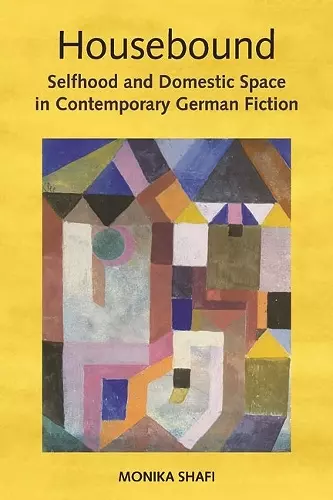Housebound
Selfhood and Domestic Space in Contemporary German Fiction
Format:Hardback
Publisher:Boydell & Brewer Ltd
Published:1st Oct '12
Should be back in stock very soon

Reveals and analyzes the current strong emphasis in German literature on the role of houses and homes in our constructions of selfhood and belonging. In life and in fiction, houses are compelling objects that shape an impressive range of personal and public affairs. A house embodies experiences often intensely emotional, and it also represents both a major financial investmentand a material reality embedded in architectural, aesthetic, and social traditions. The house, the place where we try to be at home, can be regarded -- as theorists from Gaston Bachelard to Edward S. Casey have argued -- as the key space for our constructions of selfhood and belonging. A host of contemporary German narratives featuring houses highlight this relationship between selfhood and domestic space. Beginning with a historical and theoretical overview of the house in German literature, Housebound analyzes the shelters -- often highly ambivalent spaces -- that writers such as Katharina Hacker, Arno Geiger, Walter Kappacher, Monika Maron, Jenny Erpenbeck, Judith Hermann, Barbara Honigmann, and Emine Sevgi Özdamar build in their texts and what these reveal about contemporary selfhood in Germany and its relationship to the social world. The concluding comparative analysis of Katharina Hacker's Die Habenichtse and the English novelist Ian McEwan's Saturday reveals these developments in another national literature and makes a case for the global appeal of the domestic as a major site of identity politics. Monika Shafi is the Elias Ahuja Professor of German and Chair of the Department of Women and Gender Studies at the University of Delaware.
Shafi's readings of the texts are well crafted, insightful, and a pleasure to read. . . . Housebound is an important beginning for the examination of domestic space in German-language fiction . . . . * MONATSHEFTE *
The panorama is laid out broadly, the selected corpus of texts varied, and the interpretive process detailed and well informed. Discourses about body and Heimat, memory and remembrance, escapism and the uncanny enrich Shafi's primarily text-oriented, hermeneutic approach. . . . [Her] study shows in convincing fashion that space - in the form of the house - assumes an elevated position and function in the analysis of not only contemporary narrative texts. . . . Throughout, Shafi's enthusiasm for her topic is noticeable. Housebound, beyond pursuing specific connections [concerning its thesis], presents an equally successful general introduction to the texts analyzed, and thereby to a broad selection of contemporary German fiction. * LITERATURKRITIK.DE *
German-language writers have consistently used the home . . . as an anchor of metaphor for the emotional and narrative frame for literature. From [19th- and early 20th-century German writers such as Raabe, Freytag, Fontane, and Mann] right up to the contemporary works Shafi deals with, this domestic space reveals emotional textures that are at the heart of both literary work and national character. . . . What emerges is a surprisingly profound understanding of contemporary German and Austrian values. . . . Highly recommended. * CHOICE *
ISBN: 9781571135247
Dimensions: unknown
Weight: 500g
238 pages